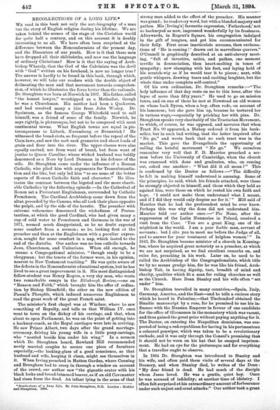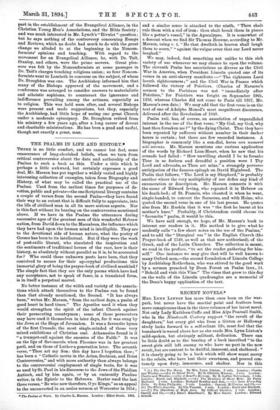RECOLLECTIONS OF A LONG LIFE.*
WE read in this book not only the autobiography of a man but the story of English religion during his lifetime. We are taken behind the scenes of the stage of the Christian world for quite half a century, and on this account it is doubly interesting to us all. We have often been surprised at the difference between the Nonconformists of the present day, and the Dissenters of our youth. How is it that these men have dropped all their shibboleths, and now use the language of ordinary Christians? How is it that the saying of Arch- bishop Whately, that the God of the Calvinists was the devil with " God " written on his forehead, is now no longer true ? The answer is hardly to be found in this book, through which,
however, we will take our readers with the double object of delineating the man and that movement towards comprehen- sion, of which he illustrates the force better than the rationale. Dr. Stoughton was born at Norwich in 1807. His father, called "the honest lawyer," worshipped as a Methodist, though he was a Churchman. His mother had been a Quakeress, and had received many a kiss from John Wesley. Dr.
Squintum, as the famous George Whitefield used to call himself, was a friend of some of the family. Norwich, he says rightly, is picturesque, but not to be compared with most continental towns. What English towns are equal in pic- turesqueness to Liibeck, Nuremberg, or Brunswick He
witnessed the bread-riots, so frequent before the repeal of the Corn-laws, and saw the mob sack granaries and shoot loads of grain and flour into the river. The upper classes were also equally excited, not from want of bread, but from want of justice to Queen Caroline, whose wicked husband was boldly denounced as a Nero by Lord Denman in his defence of the wife. Dr. Stoughton came under the influence of a Roman Catholic, who plied him with arguments for Transubstantia- tion and the like, but only led him " to see some of the better aspects of Roman Catholic faith and character." He illus- trates the contrast between the bigoted and the more charit- able Catholics by the following episode :—In the Cathedral of Rouen sat a Protestant Englishman, surrounded by Catholic Frenchmen. The Cardinal Archbishop came down from the altar, preceded by the Canons, who all took their place opposite the pulpit, and by the side of the heretic. The preacher with extreme vehemence denounced the wickedness of Protes- tantism, at which the good Cardinal, who had given many a cup of cold water to Frenchmen and Germans in the war of 1871, seemed much disappointed, as he no doubt expected some comfort from a sermon ; so he, looking first at the preacher and then at the Englishman with a peculiar expres- sion, sought for some comfort in a nap, which lasted to the end of the diatribe. Our author was no less catholic towards Jews, Churchmen, and Unitarians. When old enough, he *came a Congregational minister, "though ready to be a clergyman; but the tenets of the former were, in his opinion, nearest to New Testament teaching." He was quite aware of the defects in the Nonconformist educational system, but he has lived to see a great improvement in it. His most distinguished fellow-student was Henry Rogers, a very shy man, who wrote two remarkable essays in the Edinburgh Eeview,—one on "Reason and Faith," which brought him the offer of ordina- tion by Bishop Blomfield; the other on the new edition of Pascal's Thoughts, which induced numerous Englishmen to read the great work of the great French saint.
The minister's first chapel was at Windsor, where he saw something of Royalty, and tells us that William IV. once went to town on the dickey of his carriage, and that, when about to open Parliament, be was on the point of getting into a hackney-coach, as the Royal carriages were late in arriving. He saw Prince Albert, two days after the grand marriage- ceremony, driving his young wife in a little pony-carriage, who "nestled beside him under his wing." In a sermon which Dr. Stoughton heard, Rowland Hill recommended newly married couples to secure one piece of furniture especially,—the looking-glass of a good conscience, so that husband and wife, keeping it clean, might see themselves in it. When Irving preached in Hatton Garden, where Canning and Brougham had to creep in through a window on account of the crowd, our author saw "the gigantic orator with his black locks and broad-brimmed beaver, as if an old Covenanter had risen from the dead. An infant lying in the arms of that • ktoo1idttiona of a Long Life. By John. Stoughton, D.D. London : Hodder and Stoughton. 1894. strong man added to the effect of the preacher. His manner was grand ; he read every word, but with a blended majesty and pathos. His [Irving's] favourite expression, Fatherhood,' not so hackneyed as now, impressed wonderfully by its freshness. Afterwards, in Regent's Square, his congregation indulged in the gift of tongues, and got him excommunicated for their folly. First arose inarticulate screams, then exclama- tions of He is coming ! ' drawn out in marvellous quavers." O'Connell is graphically described at an anti-slavery meet- ing, "full of invective, satire, and pathos, one moment terrific in denunciation, then heart-melting in tones of sympathy; now stamping with his foot, and laying hold of his scratch-wig as if he would tear it to pieces ; next, with gentle whispers, drawing tears and exciting laughter, but the whole time under complete self-control."
Of his own ordination, Dr. Stoughton remarks :—" The holy influence of that day rests on me to this hour, after the lapse of more than fifty years." He used to go on mission tours, and on one of these he met at Newstead an old woman on whose back Byron, when a boy, often rode, on account of his lameness; but she gave him up, because he tortured her in various ways,—especially by pricking her with pins. Dr. Stoughton speaks very charitably of the Tractarian Movement, to which, of course, he was opposed, and narrates that when Tract No. 90 appeared, a Bishop ordered it from his book- seller, but in such bad writing, that the latter inquired after " No go," and wrote back that no such tract was in the market. This gave the Evangelicals the opportunity of calling the hateful movement " No go." We ourselves remember very well that F. D. Maurice preached a ser- mon before the University of Cambridge, when the church was crammed with dons and graduates, who, on coming out, asked one another : " What did it all mean ?" This is confirmed by the Doctor as follows :—" The difficulty he felt in making himself understood is amusing. Some of the principles, he said, which his friends attacked, were those he strongly objected to himself, and those which they held as against him, were those on which he rested his own faith and hope. I could not make them understand what I meant, and if I did they would only despise me for it." Mill said of Maurice that he had the profoundest mind he ever knew. Perhaps this was why the dons did not understand him. Maurice told our author once :—" Pio Nono, after the suppression of the Latin Nunneries in Poland, received a visit from the Czar. You are a great King, one of the mightiest in the world. I am a poor feeble man, servant of servants ; but I cite you to meet me before the Judge of all, and to answer for your treatment of helpless women." In 1843, Dr. Stoughton became minister of a church in Kensing- ton, where he acquired great notoriety as a preacher, at which we are not surprised, as we find excellent remarks on, and rules for, preaching in his work. Later on, he used to be called the Archbishop of the Congregationalists, which title we by no means grudge him, for he was like his friend, Arch- bishop Tait, in having dignity, tact, breadth of mind and charity, qualities which fit a man for ruling churches as well as the Church. Here Dean Stanley and his wife often " sat under " him.
Dr. Stoughton travelled in many countries,—Spain, Italy, Germany, America, and the East—and he tells a curious story which he heard in Palestine,—that Tischendorf obtained the Sinaitic manuscript by a ruse, for he promised to use his in- fluence with the Russian Emperor in favour of one candidate for the office of CEconomos in the monastery which was vacant, and thus gained the great prize without paying anything for it. The Doctor, on entering the Neapolitan dominions, was sus- pected of being a red-republican for having in his portmanteau a coloured penwiper, which was taken to be a revolutionary cockade, and it was only through the Consul's promising that it should not be worn on his hat that he escaped imprison- ment. He had an eye for the picturesque and for everything that a traveller ought to observe.
In 1864 Dr. Stoughton was introduced to Stanley and his wife, and often paid them visits of several days at the Deanery, and when Stanley died, he writes of the Dean : " My dear friend is dead. He had much of the disciple whom Jesus loved. He was a gentle, quiet boy. Once he was accused of infidelity; at another time of idolatry. I often felt surprised at his extraordinary amount of forbearance under such unjust and cruel attacks." Our author took a great
part in the establishment of the Evangelical Alliance, in the Christian Young Men's Associations, and the Bible Society ; and was much interested in Mr. Lynch's "Rivulet " question ; but he says nothing of the controversy concerning Essays and Reviews, which no doubt had much to do with the great change we alluded to at the beginning in the Noncon- formists' opinions and teaching. With regard to the movement for an Evangelical Alliance, he, with Dr. Tait, Stanley, and others, were the prime movers. Great plea- sure was felt by the Nonconformists at some passages in Dr. Tait's charges touching religious union; so four Noncon- formists went to Lambeth to converse on the subject, of whom Dr. Stoughton was one. The Archbishop informed him that many of the Bishops approved of the movement, and a conference was arranged to consider answers to materialistic and atheistic sophisms, to counteract the ignorance and indifference prevailing among the artisans, especially as to religion. This was held soon after, and several Bishops were present and made suggestions, but they, especially the Archbishop, had little hope of seeing one great Church under a moderate episcopacy. Dr. Stoughton retired from his ministry a few years ago, after a long career of devout and charitable ministrations. He has been a good and useful, though not exactly a great, man.



































 Previous page
Previous page